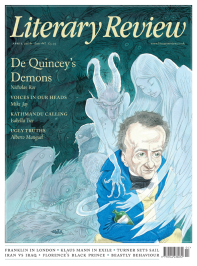Adrian Tinniswood
Reason’s Season
The Age of Genius: The Seventeenth Century and the Birth of the Modern Mind
By A C Grayling
Bloomsbury 351pp £25
‘The seventeenth century is a very special period in human history,’ says A C Grayling on the opening page of The Age of Genius. ‘It is in fact the epoch in the history of the human mind.’
This is quite a claim, and Grayling goes about supporting it in rather an unusual way. Instead of the learned disquisition on Hobbes, Locke and Descartes that one might expect from such an eminent philosopher, the first third of the book – a hundred pages in total – offers a blow-by-blow account of the Thirty Years’ War, from the Defenestration of Prague right through to the Peace of Westphalia. We read about Tilly’s victory over Christian of Anhalt at the Battle of the White Mountain, the sack of Magdeburg and the death of Wallenstein, the Diet of Regensburg and the Edict of Restitution.
Now, God knows, anyone who can steer this particular reader through the labyrinth of diets and edicts and treaties that populate the Thirty Years’ War deserves the highest praise. And Grayling is a model of clarity. Even when Emperor Ferdinand gives command of the imperial armies to Archduke Ferdinand, who

Sign Up to our newsletter
Receive free articles, highlights from the archive, news, details of prizes, and much more.@Lit_Review
Follow Literary Review on Twitter
Twitter Feed
Under its longest-serving editor, Graydon Carter, Vanity Fair was that rare thing – a New York society magazine that published serious journalism.
@PeterPeteryork looks at what Carter got right.
Peter York - Deluxe Editions
Peter York: Deluxe Editions - When the Going Was Good: An Editor’s Adventures During the Last Golden Age of Magazines by Graydon Carter
literaryreview.co.uk
Henry James returned to America in 1904 with three objectives: to see his brother William, to deliver a series of lectures on Balzac, and to gather material for a pair of books about modern America.
Peter Rose follows James out west.
Peter Rose - The Restless Analyst
Peter Rose: The Restless Analyst - Henry James Comes Home: Rediscovering America in the Gilded Age by Peter Brooks...
literaryreview.co.uk
Vladimir Putin served his apprenticeship in the KGB toward the end of the Cold War, a period during which Western societies were infiltrated by so-called 'illegals'.
Piers Brendon examines how the culture of Soviet spycraft shaped his thinking.
Piers Brendon - Tinker, Tailor, Sleeper, Troll
Piers Brendon: Tinker, Tailor, Sleeper, Troll - The Illegals: Russia’s Most Audacious Spies and the Plot to Infiltrate the West by Shaun Walker
literaryreview.co.uk